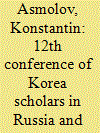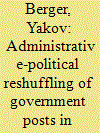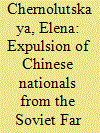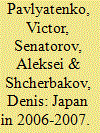|
|
|
Sort Order |
|
|
|
Items / Page
|
|
|
|
|
|
|
| Srl | Item |
| 1 |
ID:
084052


|
|
|
|
|
| Publication |
2008.
|
| Summary/Abstract |
On March 27 - 28 the 12th annual academic conference of Korea scholars in Russia and the CIS countries was held at the Institute for Far Eastern Studies of the Russian Academy of Sciences. The main subject discussed was "Korea on the Threshold of Changes.
|
|
|
|
|
|
|
|
|
|
|
|
|
|
|
|
| 2 |
ID:
084042


|
|
|
|
|
| Publication |
2008.
|
| Summary/Abstract |
Every five years, the personnel makeup of all legislative and deliberative organs in China, including the National People's Congress (NPC) and the Chinese People's Political Consultative Conference (CPPCC), is reshuffled. During these five-year reshufflings, the top officials in all branches of the national government are either newly appointed or confirmed for another term.
|
|
|
|
|
|
|
|
|
|
|
|
|
|
|
|
| 3 |
ID:
084047


|
|
|
|
|
| Publication |
2008.
|
| Summary/Abstract |
The geopolitical situation on the Korean Peninsula has a significant impact on cooperation between Russia and South Korea. South Korea is frequently forced to follow a policy of compromise in its foreign policy under unceasing pressure of the U. S. administration, and the long history of confrontation between the U. S. and the U. S. S. R. in Northeast Asia continues to have an influence on the relations between Russia and South Korea.
|
|
|
|
|
|
|
|
|
|
|
|
|
|
|
|
| 4 |
ID:
084050


|
|
|
|
|
| Publication |
2008.
|
| Summary/Abstract |
In the past fifteen years or so the history of ethnic deportations in the USSR has been an object of active studies. However, among many publications one can hardly find a special work devoted to the eviction of Chinese nationals from the Soviet Far East in 1938. The main reason for this is the difficulty to find the necessary sources. At present, there is a limited amount of declassified material, including the "special records" of the sessions of the Politburo of the CC AUCP(B),1 several orders of the NKVD of the USSR2 and individual documents in the archives of the Far East. They contain several directives of the central bodies of power and fragmentary information from certain places, but, unfortunately, there are no detailed accounts of the deportation as such and its results.
|
|
|
|
|
|
|
|
|
|
|
|
|
|
|
|
| 5 |
ID:
084044


|
|
|
|
|
| Publication |
2008.
|
| Summary/Abstract |
The central event in the political life of Japan in 2006 was the change of the country's leader. After staying in power for five and a half years (the longest period among all prime ministers of Japan since 1945) Junichiro Koizumi left his post of the head of the ruling party and government. A new leader has come to replace him.
|
|
|
|
|
|
|
|
|
|
|
|
|
|
|
|
| 6 |
ID:
084051


|
|
|
|
|
| Publication |
2008.
|
| Summary/Abstract |
The Chinese-Soviet relations in the sphere of politics, economics and culture have always been a topical and intriguing problem. The two neighbouring states, China and the Soviet Union (Russia), closely connected geographically, have always been extremely important for each other, especially in the exchange of the forms of consciousness, which had an impact on the activity and development of the two states. There is no need to prove that the basis of a full-fledged and equal exchange between them consists in mutual knowledge and better mutual understanding. They can be founded on different methods and views in purely political, historical or economic research. As to research in the field of literature and culture, it can make its contribution to international relations and cultural exchanges.
|
|
|
|
|
|
|
|
|
|
|
|
|
|
|
|
| 7 |
ID:
084048


|
|
|
|
|
| Publication |
2008.
|
| Summary/Abstract |
The construction of harmonious socialist society is one of the major tasks to be tackled by the Communist Party of China and the Chinese state in a long-term perspective. This undertaking can hardly be overestimated. According to the newspaper Renmin ribao, "the theory of the construction of socialist harmonious society is an important theoretical innovation which can be compared to the theory of the initial stage of socialism and the theory of the socialist market economy."1 In essence, the newspaper continues, the theory of the construction of socialist harmonious society determines the general orientation of social construction with Chinese specific features.
|
|
|
|
|
|
|
|
|
|
|
|
|
|
|
|
| 8 |
ID:
084046


|
|
|
|
|
| Publication |
2008.
|
| Summary/Abstract |
Current demand and forecasts for gas needs in the APR. The Asia-Pacific Region (APR, or Pacific Rim) is today the world's most dynamic international market for natural gas. In the past few decades (late 20th and early 21st centuries), demand for gas in the APR has grown and construction of gas delivery systems proceeded faster than in the rest of the world and led to a rise of the region's share of global gas consumption by a factor of 15 over 40 years. In 1965, APR consumers used up 5.9 billion m3 of gas; in 1970, they needed 15.7 billion m3; in 1980, their requirements went up to 70.4 billion m3, which more than doubled in 1990, to 158.6 billion m3, reaching 438.5 billion m3 of natural gas in 2006, or above 15% of global demand
|
|
|
|
|
|
|
|
|
|
|
|
|
|
|
|
| 9 |
ID:
084045


|
|
|
|
|
| Publication |
2008.
|
| Summary/Abstract |
Taiwan's latest elections for Head of Administration (or President, according to the terminology used there) were held on March 22, 2008. The winner was the Kuomintang candidate and former mayor of Taipei Ma Yingjiu, who garnered 58.45% of the vote - a landslide victory, compared to the 41.55% that went to his opponent Xie Changting, Chairman of the Democratic Progressive Party (DPP), which favors Taiwan's complete separation from Mainland China
|
|
|
|
|
|
|
|
|
|
|
|
|
|
|
|
| 10 |
ID:
084049


|
|
|
|
|
| Publication |
2008.
|
| Summary/Abstract |
The national armies ("people's armies") of Kuomintang came into being on the military-political scene of China in the autumn of 1924 as a result of a split in the grouping of General Wu Peifu, which controlled Central China: the troops under the command of General Feng Yuxiang1 broke away from General Wu's army group. General Feng staged a coup in Beijing on October 23, 1924. renamed his troops into national armies, and as the commander of the 1st National Army occupied the Beijing district and Inner Mongolia. Another group, consisting of people from the Shenxi province, commanded by General Hu Jingyi, continued its offensive to the south, drove the remaining troops of General Wu from the Henan province, and remained there, having taken the name - the 2nd National Army. General Hu became the military governor of the province
|
|
|
|
|
|
|
|
|
|
|
|
|
|
|
|
|
|
|
|
|